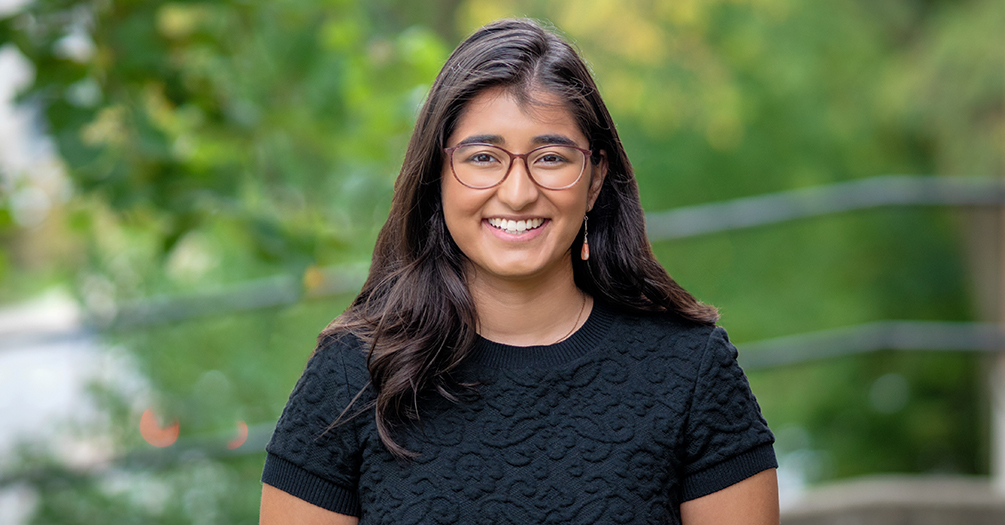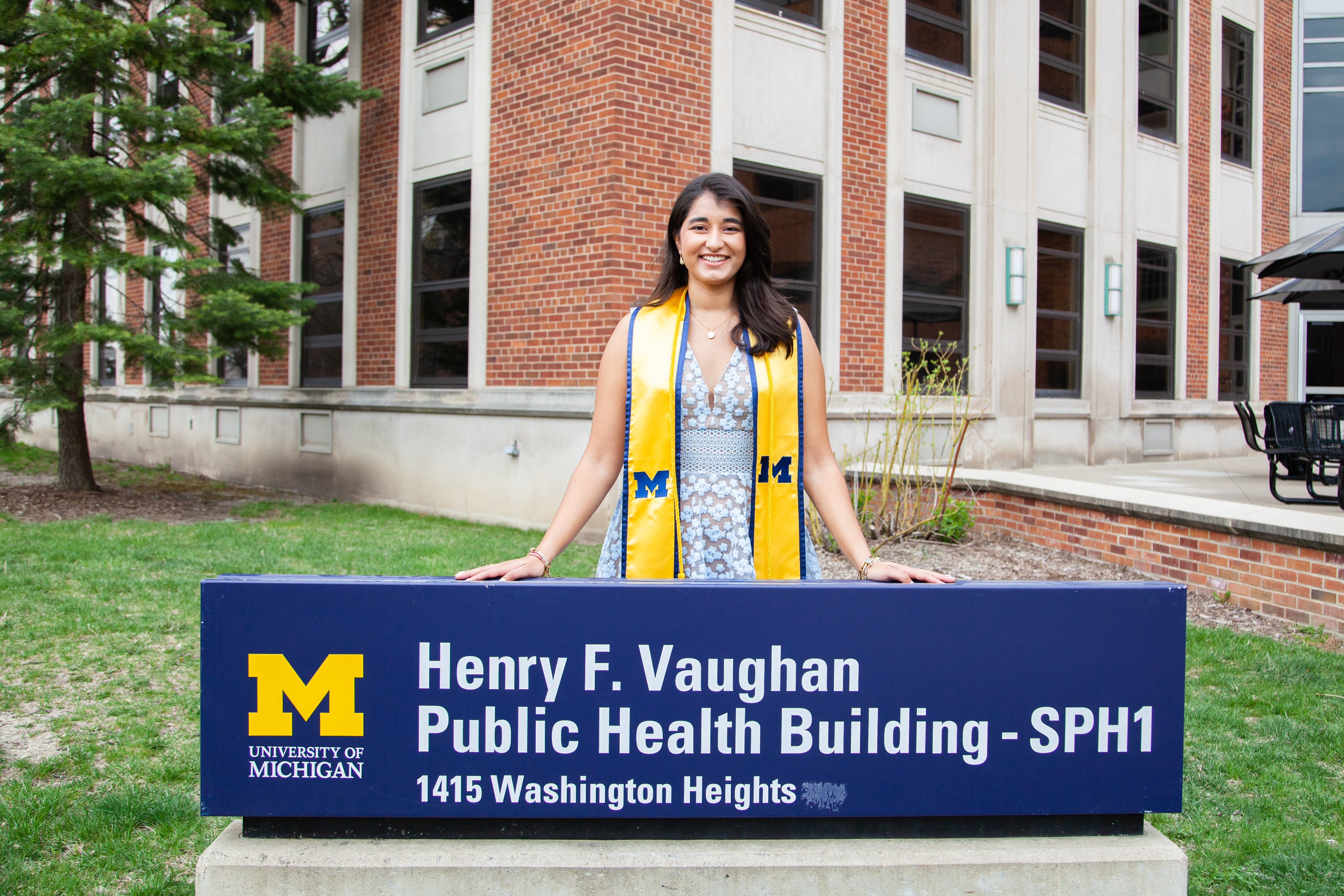Alumna embraces humanistic approach to public health

Meghna Singh, BA ’23
Community and Global Public Health
Nearly 10 years ago, in November 2014, Meghna Singh, BA ’23, lost a family friend to suicide. That loss was a catalyst to what has become her life’s work.
She describes the ripple effect from that moment like a rock being thrown into a pond. Starting out small, she began having conversations with her own family and friends about suicide and mental health. This grew into educational presentations in classrooms and during club meetings. Next was a high school student council initiative to pass out wristbands imprinted with the Crisis Text Line number, posters listing resources in every classroom, and, eventually, the 2018 Teen Wellness Conference that reached more than 200 youths in the San Francisco Bay Area.
Singh, a 2023 alumna of the University of Michigan School of Public Health, didn’t know it at the time, but the steps she started taking in eighth grade were part of mental health advocacy, a component of public health.
“Losing Cameron [who was her brother Kunal’s best friend], has forever changed my life,” Singh said. “It has motivated me to want to address the root cause of the problem, drawing me to prevention rather than treatment. There are so many ways to address the societal factors that contribute to suicide rates by providing essential, life-sustaining resources.”
Suicide is one of the leading causes of death in the United States. In 2021, 48,183 people died by suicide in the United States, according to the Centers for Disease Control and Prevention, or one death every 11 minutes.
Because it is an upper-level bachelor’s degree program, Singh had to wait to apply to the Michigan Public Health Bachelor of Arts program in Community and Global Public Health until midway through her sophomore year, but she began taking classes her freshman year.
“I am so grateful for the small community we had up on the hill,” she said. “In addition to my education, getting to know faculty members and having a cohort was a great experience. Taking undergraduate and graduate electives opened up the ability to make connections and find and build community in such a large school.”
The opportunity to take courses across the University of Michigan, in addition to her coursework at the School of Public Health, also contributed to the breadth of her college experience.
In addition to my education, getting to know faculty members and having a cohort was a great experience. Taking undergraduate and graduate electives opened up the ability to make connections and find and build community in such a large school.”
“I was excited about the opportunity to take classes in any college and school at the university,” she said, highlighting the College of Literature, Sciences, and the Arts and its Honors Program, the Marsal Family School of Education, and the School of Social Work. “I appreciated the different perspectives various fields take about public health topics. There is overlap, but there are also differences in how the fields think and the approaches they take to address social issues.
“This interdisciplinary approach allowed me to maximize my education, truly learning as much as I could.”
Singh said this course of study prepares graduates for the field in a true-to-life way, because public health itself is interdisciplinary, including legal professionals who focus on policy, medical professionals who focus on care and treatment, and public health professionals who take a more population-centered approach.
This population- or community-centered approach is what drew Singh to the school’s BA program (Michigan Public Health also offers a Bachelor of Science in Public Health Sciences).
“I wanted to learn how to develop community interventions, and the communication skills to help on the education side of things,” she said, adding that she gravitates toward behavioral health, but is also interested in substance use and harm reduction. “I love the approach that you’re meeting people where they’re at in their substance use journey.”
Singh, who was offered the position right before graduation in April, has worked as a substance use navigator in an emergency department in San Mateo, California, since July 31. She supports patients with opioid or alcohol addiction by providing case management, working with others to provide medication-assisted treatment, and connecting them to resources.
“It is challenging, but it has public health themes,” she said. “Every day, we are talking one-on-one about life experiences, learning about their barriers and stressors, and addressing determinants of health.
“You have to remember that people are people, humans with emotions. We give them tips, tools, and strategies so that they can use them in a safer way. If they’re not ready to stop drinking and using, we’re going to respect that. I appreciate this humanistic approach.”
Singh said she experienced a similar humanistic approach in the way School of Public Health professors interacted with students, especially when it came to mental health.
“They went above and beyond,” she said. “They were supportive and respectful; they wanted to work together to figure out next steps. They treated us as people and humans first, students second.”
I wanted to learn how to develop community interventions, and the communication skills to help on the education side of things. I love the approach that you’re meeting people where they’re at in their substance use journey.”
While in Ann Arbor, Singh held leadership roles at the Adelante Lab with Bill Lopez, clinical assistant professor of Health Behavior and Health Education, in the School of Public Health and with the University of Michigan Chapter of the American Foundation for Suicide Prevention. As Adelante Lab manager, she worked on Black and Pink events designed to build connections through prison walls, including a pen pal letter writing program and an art exhibit.
As president of the University of Michigan Chapter of the American Foundation for Suicide Prevention, Singh coordinated a community 5K walk, Out of the Darkness, that raised more than $38,000 and had more than 450 registered walkers. The annual event provides an opportunity for walkers to share their connections to the cause and open conversation about mental health and suicide prevention.
The COVID-19 pandemic has opened the doors for conversation about mental health, but Singh said it’s still sometimes hard to follow the advice she gives others.
“Having lost multiple friends, peers and classmates to suicide, as recently as January of this year, has been a challenge, but it’s even more of a motivation and reminder of why I do what I do,” she said. “There are definitely times when it’s incredibly hard to do the work and also grieve and honor the friends I’ve lost, so I try to find balance. I try to create a more welcoming, inclusive, mental health-centered society. I also recognize there are days when it’s too much and I have to decline meetings, step away from being the point person and respect my own mental health.”
Singh clears her mind by listening to podcasts and going on walks, but it is football that brings her friends and family together. She chose the University of Michigan in part because of its reputation for football and school spirit. In addition to watching the Wolverines, she watches the New England Patriots, a holdover from growing up in Boston. When she’s not working or watching football, Singh is planning the next step in her educational journey.
“I am looking at dual graduate majors that will further my public health skills and my social work/direct counseling skills,” she said. “I will always want to help people before they are in crisis; I think there are so many opportunities to catch people who are struggling. But in addition to my public health focus on the macro/population level, I want to develop more skills at the individual level, one-on-one or in small groups.”
Mental health resources
- University of Michigan Crisis Services: Counseling and Psychological Services (CAPS) provides free confidential psychological services for current University of Michigan undergraduate and graduate students.
- Crisis Text Line is a global nonprofit organization providing free and confidential text-based mental health support and crisis intervention by texting HELLO to 741741.
- 988 is a three-digit dialing code that routes callers to the 988 Suicide and Crisis Lifeline (or 988 Lifeline).

